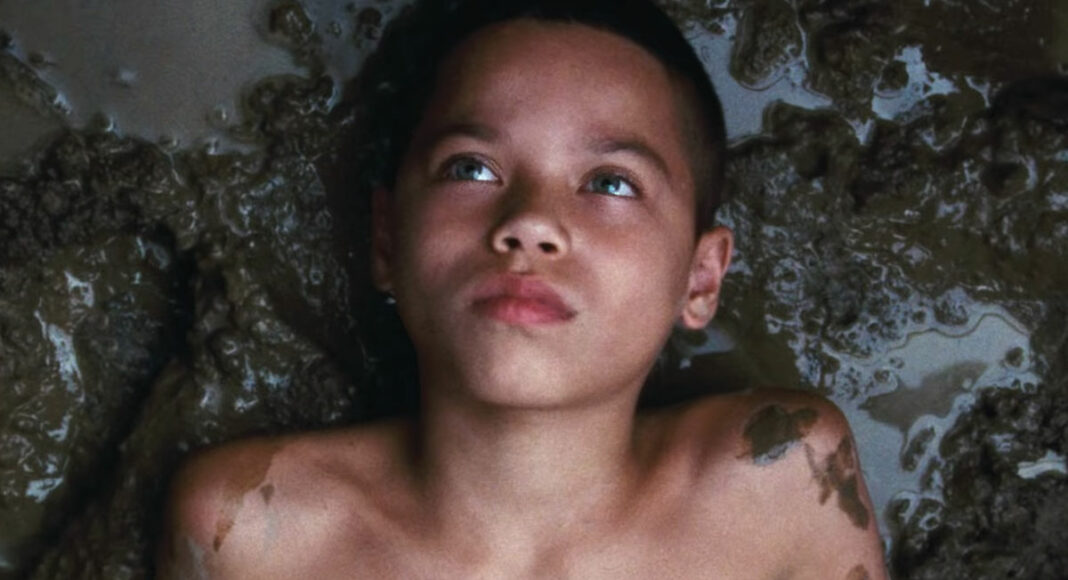It could almost be a Third World country. The overgrown landscape is lush and green, with rambling, clapboard houses tucked in here and there, and a swimming hole hidden under an outcropping of trees. It’s an Eden for two of three young brothers growing up half-wild in the woods of upstate New York while their parents are preoccupied with each other—but a challenging proving ground for the youngest brother struggling to come of age in We the Animals.
Documentary filmmaker Jeremiah Zagar makes an impressive transition to fictional storytelling in We the Animals. Adapted by Zagar and Dan Kitrosser from the novel by Justin Torres, the movie is a lyrical plunge into the subconscious of a boy on the brink of manhood trying to piece together his own identity. Zagar manages a very deft balance between powerful, evocative visual style and the casual poetry of Torres’ narrative voice, using minimalist dialogue, documentary realism, and fanciful animation to tell a simple-seeming, yet complex and moving tale.
The story is set in the 1980s, when Torres himself was growing up, and the absence of cell phones, social media, or basically any kind of technology (besides a broken-down TV) adds an extra layer of mysteriousness and insularity to the brothers’ lives. Jonah (Evan Rosado) is the youngest, just about to turn 10. His two older, alpha siblings are Manny (Isaiah Kristian) and Joel (Josiah Gabriel).
While his brothers take after the quick-tempered Puerto Rican father they call Paps (Raul Castillo), Jonah is closer to their mother, Ma (Sheila Vand), who tries to protect his sensitivity from the harshness of life. But the playful, simmering sexual tension between their parents that fascinates the boys also explodes into anger sometimes when things don’t go right. And when Paps lashes out, it’s Ma on the receiving end.
But Jonah has a private escape route from the unpredictability of family life. At night, while the others sleep, he sneaks off to scribble his own story in a secret notebook, illustrated by expressionistic drawings—not only of what he sees, but what he feels and imagines. These rough-hewn images take flight on the page, providing a vivid, animated commentary on the fractious realities of Jonah’s life.
At the same time, Jonah’s words provide another ongoing narrative as he appraises his family life. “Us three. Us brothers. Us kings,” he says at the outset. “We wanted more. More volume. More muscle.” But when they all charge indoors to find their parents peacefully curled up together on the sofa, asleep, he notes, “Sometimes less. Less noise.”
When Paps takes off after a violent interlude, and Ma is too despondent for a while to care for them, the brothers try shoplifting at the mini-mart for food. But eventually, Paps does come back, when, Jonah notes, “He wanted more of us. More of her. More of our family.” As the family’s precarious fortunes—financial and emotional—fluctuate, the older brothers become more aggressive, testing and taunting Jonah to the point that they start appearing as beaked, flying demons in Jonah’s drawings.
Questions of male identity and adulthood percolate throughout the tale as Jonah searches for his own place in the world, separate from his family unit. And filmmaker Zagar makes the journey compelling by sticking close to Jonah’s viewpoint, observing everything, and setting it to Nick Zammuto’s yearning musical soundtrack and Mark Samsonovich’s animated sequences, which beautifully convey Jonah’s inner life.
Castillo and Vand are quite good as the parents whose volatility has such an impact on their kids’ lives. (When Paps teases Ma that they should “make some more boys,” she groans, “Just what I need—more men!”) There’s enough going on in the story to keep viewers invested, but this is not a movie of big events. Instead, it depends on small, profound moments—like the first time the brothers see their humbled father close to tears—to achieve its singular vision.
WE THE ANIMALS
*** (out of four)
With Evan Rosado, Isaiah Kristian, Josiah Gabriel, Sheila Vand, Raul Castillo. Written by Dan Kitrosser and Jeremiah Zagar. Based on a novel by Justin Torres. Directed by Jeremiah Zagar. Rated R. 94 minutes.












